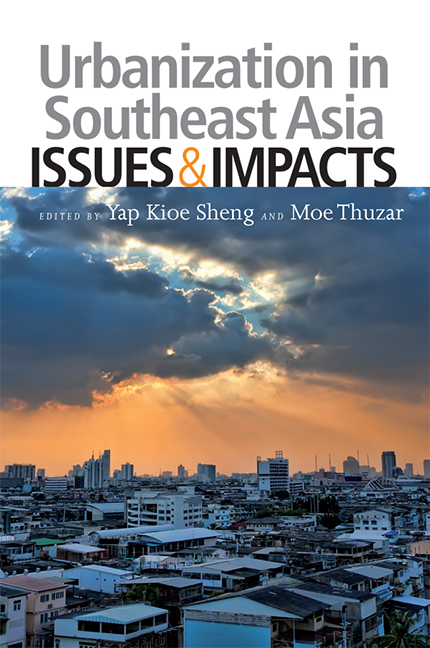Book contents
- Frontmatter
- Contents
- Message from Head, ASEAN Studies Centre
- Message from Director, Centre for Liveable Cities
- About the Contributors
- Introduction
- Urbanization in Southeast Asian Countries: Recommendations
- 1 The Challenges of Promoting Productive, Inclusive and Sustainable Urbanization
- Cities as Engines of Development
- Inclusive Cities
- Cities and the Environment
- Governance, Decentralization, and Urbanization
- 12 Decentralization and Good Urban Governance in Southeast Asia: Focus on the Philippines, Indonesia, and Thailand
- 13 Contexts and Challenges in Engaging Local Governments for Sustainable Urban Development in Southeast Asia
- 14 Governance and Accountability in Southeast Asian Cities
- Urbanization from an ASEAN Perspective
- Index
13 - Contexts and Challenges in Engaging Local Governments for Sustainable Urban Development in Southeast Asia
from Governance, Decentralization, and Urbanization
Published online by Cambridge University Press: 21 October 2015
- Frontmatter
- Contents
- Message from Head, ASEAN Studies Centre
- Message from Director, Centre for Liveable Cities
- About the Contributors
- Introduction
- Urbanization in Southeast Asian Countries: Recommendations
- 1 The Challenges of Promoting Productive, Inclusive and Sustainable Urbanization
- Cities as Engines of Development
- Inclusive Cities
- Cities and the Environment
- Governance, Decentralization, and Urbanization
- 12 Decentralization and Good Urban Governance in Southeast Asia: Focus on the Philippines, Indonesia, and Thailand
- 13 Contexts and Challenges in Engaging Local Governments for Sustainable Urban Development in Southeast Asia
- 14 Governance and Accountability in Southeast Asian Cities
- Urbanization from an ASEAN Perspective
- Index
Summary
This chapter aims to identify key challenges in engaging local governments in the Southeast Asian region in the promotion of sustainable urban development. The engagement with local governments is considered imperative in the context of various macro-level transformations that are currently going on in the region, namely rapid economic growth, urbanization, democratization, and decentralization. These transformations have generally thrust local governments and local communities into prominence in ensuring that rapid urban development in the region is more sustainable, or otherwise allowing the formation of harmful towns, cities, and urban settlements through neglect or lack of capacity.
Therefore, it is crucial that local governments and communities have the necessary awareness and knowledge of the various aspects of sustainable urban development, as well as the needed skills and capacities to make it happen. There are at least two different ways that local governments can take to come to that point or, at least, to start embarking on a path that will lead to sustainable urban development.
One is when local governments or communities become serious in making their cities sustainable without being deliberately and significantly engaged by external parties. There are documented good practices where local leaders and communities became the major driving force for the needed local innovations.1 However, in many other cases, external parties are needed to instigate and support the initiatives. These can be in the forms of urban-related national policies, international conventions, or donor-supported projects and programmes.
In most cases though, a combination of both internal and external factors exist in the efforts to make urban development in Southeast Asia more sustainble. In addition to the two different ways, distinct political institutional settings from one country to another also engender different methods and approaches in such endeavours. This chapter elaborates on the various ways of engaging local governments in promoting sustainable urban development.
THE CONTEXT FOR INCREASING ROLES OF LOCAL GOVERNMENTS
In the past couple of decades, the Southeast Asian region has been undergoing various transformations, such as rapid economic growth that is naturally followed by urbanization, and democratization that is generally followed by decentralization of authorities to the local governments. There are certainly great variations among countries — and more starkly among cities — in the region with regard to the extent of these transformations.
- Type
- Chapter
- Information
- Urbanization in Southeast AsiaIssues and Impacts, pp. 320 - 340Publisher: ISEAS–Yusof Ishak InstitutePrint publication year: 2012

